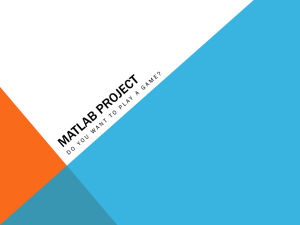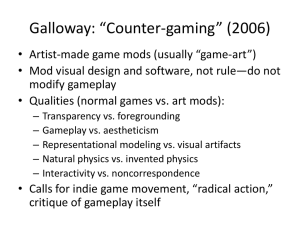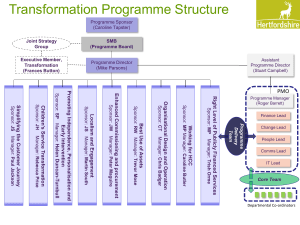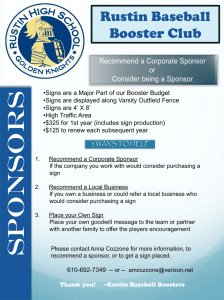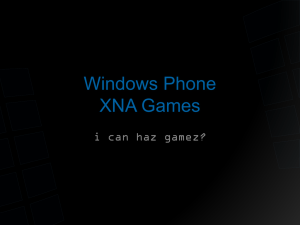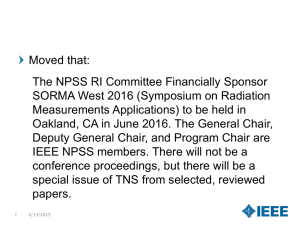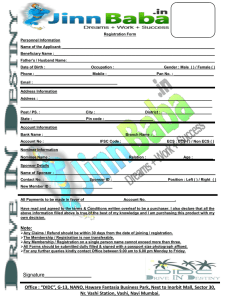Indie and Casual Game Development with Windows
advertisement
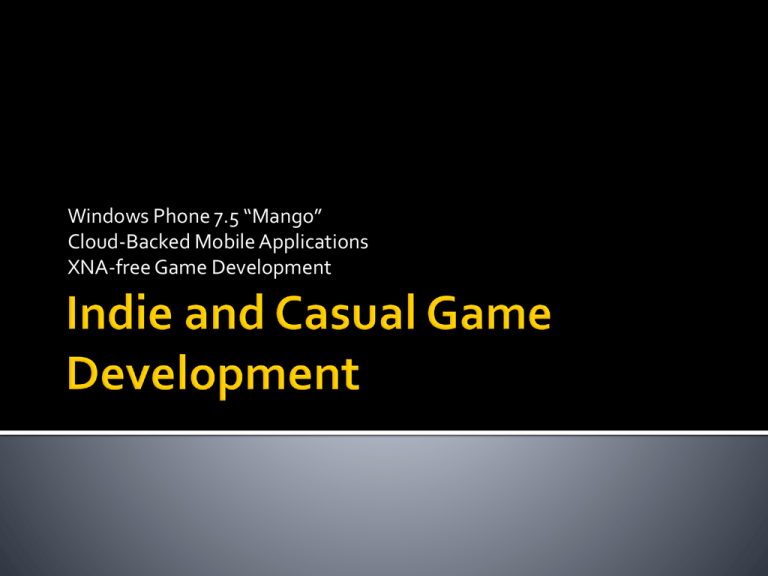
Windows Phone 7.5 “Mango” Cloud-Backed Mobile Applications XNA-free Game Development MARQUEE SPONSOR PLATINUM SPONSOR PLATINUM SPONSOR GOLD SPONSOR GOLD SPONSOR GOLD SPONSOR GOLD SPONSOR GOLD SPONSOR GOLD SPONSOR SILVER SPONSORS Who am I? Building Casual Games Multiplayer Gaming Case Study : Demo Case Study : Code Tour Lessons Learned Q&A Boredom often impetus to play Users can get interrupted frequently and unexpectedly Users often play with limited concentration Touches are clumsy with huge target zones Just because you can hold a phone like a joystick doesn’t mean it is one. Touch isn’t the only input – phones have accelerometers, compasses, GPS, etc. Network is not always available, or reliable Many successful games are “dopamine squirters” Periodic, positive reinforcement Achievements Leaderboards “Nags” (come play me!) Measurable, identifiable, frequent progress Deliver your dopamine in small, frequent doses Give users a reason to come back to your game Your app should be “part of the problem” of smart phone addiction. Players will play anything if they can advance, compete, or compare. e.g. “ProgressQuest” Don’t re-fix well-known, solved problems: Data Access & local storage Web upload and download User configuration & settings Animated & flowing UI Audio & video Open Source & Free libraries Code Samples are everywhere Google is your friend Not a good enough artist? Crowdsource one. 99designs.com Open Source libraries JSON REST/HTTP CouchDB Clients Silverlight/WP7 controls (e.g. Control Toolkit) Codeplex.com NuGet (Library Package Dependencies) Many kinds of multiplayer Cooperative vs. Competitive Real-time vs. Turn-Based Player discovery (e.g. “lobbies” and “matchmakers”) Chat Push Notifications React in real-time to player actions, even for turn- based games Real-Time Multiplayer Typically lower level, often hand-coded Sockets Pseudo-Real-Time Push Notifications via Microsoft & WP7 SDK Turn-Based Push Notifications Cloud-based middleman for phone-to-phone comms. Exceptions include local WiFi discovery of nearby phones – very ugly code. You need “code in the cloud” to send push notifications. Do you even need one? If so: RESTful Ruby via heroku.com WCF via any # of hosts, including AWS EC2 WCF via Windows Azure WCF via AppHarbor (see demo) PHP or others on other hosts AppHarbor & Heroku: git push FTW. Cloud databases are everywhere SQL Azure, SQL in EC2, SQL on AppHarbor, CouchDB Metro games use XAML HTML available for Metro games on Windows 8 Rich, storyboard-based animation library Built-in support for 3D, perspective transforms Audio/Video APIs, Media support in XAML Touch & Gesture recognition available in nonXNA apps Phone chock full of sensors & hardware that can be used by games XNA isn’t necessary for smaller, casual games XNA 2D is sprite-based using a “game loop” XNA 3D is vastly more complicated Your goal is to produce gameplay not content Only pick XNA if its required to support the gameplay for your idea! Xbox Live libraries can be used from Silverlight Still need an agreement with MSFT for XBL achievements and gamerscore If it feels like work, stop doing it. Your game must be as fun to build as it is to play Iterative, agile process Build a core nugget of functioning gameplay Pause, briefly, to clean up & refactor Repeat for each tiny gameplay unit Add finishing touches after essential gameplay is done (“Perfect is the enemy of done”) Your time is your capital Favor pay-per-use, pay-as-you-go, and especially free services Game design influences architecture, not the other way around Approx. 25 hours of coding time Multiplayer, head-to-head, turn-based strategy In-game chat Push Notifications Log of games stored Player profiles Future support for achievements, leaderboards, tourneys and ladders DEMO MVVM pattern (not library) WP7.5 Client WCF Web API hosted in AppHarbor Secure, JSON, RESTful services expose resources to facilitate gameplay User Profiles in a CouchDB database Games (ongoing and past) stored in CouchDB database User security via ASP.NET Membership Provider Membership DB in AppHarbor-hosted SQL DB Up-front cost: $0 WCF Web API dramatically reduces development time Built-in web-based JSON-aware test harness saved incredible amounts of time and effort. Used harness to simulate other player(s) as game was being developed. CouchDB JSON documents are tailor-made for agile dev Could rapidly change my data structure without mucking with foreign keys, queries, etc. Easy to upgrade docs as app version changes Map/Reduce custom JavaScript views are efficient Developer can stay object-oriented the whole time ▪ No extraneous joining tables, etc. JSON, flexible, RESTful services “Piece of cake” to add support for iPhone, Android, iPad, Windows 8 Apps can be beautiful w/out being 3D Cloud Services like AppHarbor make games like this easy! WebClient has “issues”, be wary. Suppresses RESTful HTTP response codes Caches aggressively, can create ‘stale’ service results w/no errors. Proper use of navigation service Local data caching (AgFx?) Network detection (LittleWatson?) Google Analytics Network download/progress indicator Tolerance of raw notification delivery failures Split to multiple assemblies to speed up load time Update detection (track last launched version) Crash detection & Reporting Marketplace Review Nag Transitions, animations, “fit and finish” Q&A
